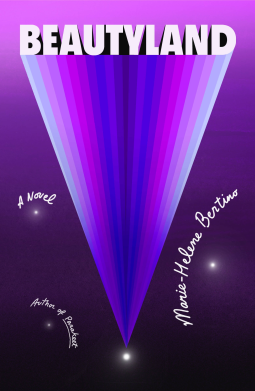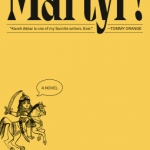- Book Reviews THE SHOCK OF THE LIGHT by Lori Inglis Hall
- Book Reviews THE VIOLIN MAKER’S SECRET by Evie Woods
- Book Reviews THE DANGER OF SMALL THINGS by Caryl Lewis
- Book Reviews NONESUCH by Francis Spufford
- Book Reviews LADY TREMAINE by Rachel Hochhauser
- Book Reviews THE ASTRAL LIBRARY by Kate Quinn
- Book Reviews THE HARD LINE, A Gray Man Novel (Gray Man series, Book 15) by Mark Greaney
- Children's Book Reviews THE NUTCRACKER by E.T.A. Hoffman
- Children's Book Reviews RANGE: HOW EXPLORING YOUR INTEREST CAN CHANGE THE WORLD by David Epstein
- Children's Book Reviews CHICKA CHICKA BOOKS: I LOVE DAD AND TRICKA TREATA

BEAUTYLAND by Marie-Helene Bertino
5 stars
In this futuristic sci-fi tale, extraterrestrial alien Adina gets transmitted and born to an Earth mother in late 1970’s Philadelphia. The novel explores the all-too-human feelings around alienation and takes a Margaret Mead (famous for studying gorillas in the wild) type examination of humans and their social conventions. Raised in poverty by a struggling single Mom and the brunt of prejudice for her dark Sicilian looks in a white neighborhood, Adina grow up feeling truly alienated.
Adina’s superiors from her home planet whose name is unpronounceable by humans but would sound like Cricket Rice (here the wry humor begins) activate Adina to consciousness at age 5 and give her the mission of reporting back to her home planet on her human experience. Specifically, they want to know if Earth and humans could provide an alternative home. Adina’s race has evolved past physical bodies into a collective consciousness.
Adina spends time with her superiors during her dreams, where they shimmer in front of a human-like classroom teaching her both human basics and glimpses into humanity’s future. Adina’s race is in distress, looking for an alternative planet to inhabit, and snuck Adina onto Earth as a human to share insights with them about humanity.
As Adina enters Earth, an unmanned probe is launched to share human culture with any intelligence that encounters it, and Carl Sagan rules the day of astronomical speculation that there must be other evolved species within the vastness of the universe.
Adina’s Mom finds an old fax machine in the trash, which turns into a one-way communication device for Adina to send written updates of what she’s found. Much of the novel centers on missives sent between Adina and her overseers – filled by poignant insights by Adina and mostly snark but from her superiors who wrap themselves up in a superior attitude of being unimpressed by humans and Adina alike. Adina gets back mostly two-word answers to her questions, mostly sardonic, from her superiors take a logical angle on all she shares, and while desperate for insights ignore the heart of Adina’s missive about the emotionality of the human experience.
Adina forms strong bonds of friendship, especially with her two gay friends Toni and Dominic, and begins to share her keen observations of humanity in a published book. As Adina matures, so do the depth of her insights. Caught between the wonders of being an individual living on Earth, an unending sense of loneliness and alienation, and the desire to return to her home collective, Adina plunges us into a unique perspective of what it means to an Earthling.
Thanks to Farrar, Straus and Giroux and NetGalley for an advanced reader’s copy.
-
 THE SHOCK OF THE LIGHT by Lori Inglis Hall
THE SHOCK OF THE LIGHT by Lori Inglis Hall
-
 THE VIOLIN MAKER’S SECRET by Evie Woods
THE VIOLIN MAKER’S SECRET by Evie Woods
-
 THE DANGER OF SMALL THINGS by Caryl Lewis
THE DANGER OF SMALL THINGS by Caryl Lewis
-
 NONESUCH by Francis Spufford
NONESUCH by Francis Spufford
-
 LADY TREMAINE by Rachel Hochhauser
LADY TREMAINE by Rachel Hochhauser
-
 THE ASTRAL LIBRARY by Kate Quinn
THE ASTRAL LIBRARY by Kate Quinn














